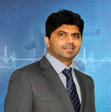Asked for Female | 32
Is Mid-Position Baby Heart Anomaly in Anomaly Scan Worrisome?
Mid-Position Baby Heart indicates no immediate cause for concern. However, it's important to keep monitoring your baby's development through regular check-ups. Symptoms like unusual movements or lack of activity may warrant attention, but these are rare. The typical causes of issues can range from genetic factors to environmental influences, but many pregnancies proceed without complications. I encourage you to maintain open communication with your gynecologist, who can offer personalized guidance and reassurance tailored to your situation.
Answered By

Dr. Swapna Chekuri
Gynecologist
Answered on 29th Mar '25
Asked for Male | 7days
Why is my baby's heart rate high and what to do?
Various factors can contribute to this, including fever, dehydration, excitement, or even stress. Symptoms often associated may include fatigue, irritability, or difficulty breathing. To support your little one, ensure they stay well-hydrated, monitor their temperature, and provide a calm environment. However, it’s essential to consult your pediatrician to rule out any underlying issues and receive tailored advice.
Answered By

Dr. Babita Goel
General Physician
Answered on 2nd Mar '25
Asked for Female | 25
Why does one doctor see hole in baby's heart?
It's understandable to have concerns about your baby's heart condition, especially with varying opinions from doctors. A "hole" in the heart, known as a septal defect, can range from mild to more serious. Many infants with such conditions can lead healthy lives, and they often close on their own over time. It’s essential to work closely with your pediatrician to monitor your baby's heart and overall health. If you're feeling uncertain, seeking a second opinion from a pediatric cardiologist can provide clarity.
Answered By

Dr. Bhaskar Semitha
Cardiac Surgeon
Answered on 16th Feb '25
Asked for Male | 15
Should my son with EDS get a cardiac consultation?
Ehlers-Danlos Syndrome (EDS) can cause the blood vessel to be unstable, therefore cardiac evaluation is of utmost importance to assess any damage that might have been inflicted on the heart's valves. A faster pulse rate is a possibility that the body is experiencing some strain; however, it is best to talk about these findings with a healthcare provider. They, in turn, will be able to issue clear, tailored advice to the patient, and if required, will set up a specialist consultation. Carrying this out at an early stage can considerably help in dealing with the symptoms.
Answered By

Dr. Babita Goel
General Physician
Answered on 24th Dec '24
Asked for Female | 6
Is 100 BPM Heartbeat During Child's Sleep Normal?
A 6-year-old having a 100 heart rate per minute while sleeping can be normal. For kids, the rate of the heart can change with the activities they do, the emotions they feel, and the sleep. The abnormality of the heart rate to 100 while sleeping can be because of dreams or a low-grade virus infection. If your child seems ok as well as doesn't have any other symptoms, observe the situation. If you are worried or you see any odd symptoms, talk to a cardiologist.
Answered By

Dr. Bhaskar Semitha
Cardiac Surgeon
Answered on 30th Oct '24
Asked for Female | 28
Is my 21-week baby's left-sided aorta a concern?
Your baby unfortunately has a double aortic arch, which is a makeup of his heart and vessels. It means the aorta, a major blood vessel, does not take its usual path. That is why children may have trouble breathing and difficulty swallowing. The good news is that this can be treated with surgery performed after the baby is born for most of the children. Doctors will talk more about what that means and guide you through it.
Answered By

Dr. Bhaskar Semitha
Cardiac Surgeon
Answered on 5th July '24
Asked for Female | 32
Will trivial tricuspid regurgitation affect baby's health?
Tricuspid regurgitation at 24 weeks means a tiny amount of blood flows back into the heart. It's common and typically doesn't cause issues for babies. Your little one will likely be fine. No treatment needed. Monitor during regular check-ups. If concerns arise, we'll address them then. For now, relax and focus on caring for yourself and your baby.
Answered By

Dr. Bhaskar Semitha
Cardiac Surgeon
Answered on 25th June '24
Asked for Female | 16
Could my daughter have cyanotic congenital heart disease?
When a baby gets born with a heart issue, their body doesn't receive enough blood flow. This condition, cyanotic congenital heart disease, causes a blue hue on their skin. The heart struggles to pump blood properly, leaving infants appearing tired and breathless. Doctors can improve blood circulation and heart function through surgeries. But catching it early and getting treatment right away is crucial.
Answered By

Dr. Bhaskar Semitha
Cardiac Surgeon
Answered on 25th June '24
Asked for Male | 11
What are treatments for Hypertrophic Cardiomyopathy (HCM) in children?
Hypertrophic cardiomyopathy is a condition where the heart's muscle thickens. This makes pumping blood difficult for the heart. Some people don't experience symptoms. Others may have chest pain, breathlessness, or fatigue. Medicines help the heart work better and reduce complication risk. Sometimes, a septal myectomy procedure improves blood flow by removing part of the thickened muscle.
Answered By

Dr. Bhaskar Semitha
Cardiac Surgeon
Answered on 25th June '24
Asked for Female | 12
Is my 12yr old's irregular heartbeat normal?
Young people, like your daughter, often experience abnormal heart rhythms. The skipping heartbeat, then a rapid one, is called palpitations. Reasons can be stress, caffeine intake, inadequate sleep, or hormonal fluctuations. Generally harmless, but mentioning it to a cardiologist is wise for reassurance.
Answered By

Dr. Bhaskar Semitha
Cardiac Surgeon
Answered on 25th June '24
Asked for Female | 29
Do I Need Baby's Heart Surgery for Renal Dysplasia?
A 2mm perimembranous VSD refers to a tiny opening in the heart. Whereas, right renal dysplasia signifies improper formation of the right kidney. Occasionally, the hole might naturally close as the baby develops further. However, if it persists, surgical intervention may be needed once the baby grows older. The likelihood of surgery depends upon the baby's progress over time. Ensure regular follow-ups with your doctor to provide optimal care for your baby.
Answered By

Dr. Bhaskar Semitha
Cardiac Surgeon
Answered on 25th June '24
Asked for Female | 6
Child with RHD: Seeking Clarity on Diagnosis
You're concerned about your 6-year-old child having rheumatic heart disease (RHD). This condition develops after strep throat infections. Signs like chest discomfort, breathing issues, and tiredness may appear. Confirming RHD requires tests like echocardiograms. Treatment involves medication to control symptoms and prevent complications, plus regular cardiologist visits. Remember, prioritize a nutritious diet and physical activity for your child's heart health.
Answered By

Dr. Bhaskar Semitha
Cardiac Surgeon
Answered on 25th June '24
Asked for Female | 10 month
Could my baby's heart hole be treated?
This is referred to as a congenital heart defect. Some signs might include difficulty breathing, poor weight gain, and a bluish tint to the skin. The hole can disrupt normal blood flow. Surgery may sometimes be needed to repair the hole, but not always. Your baby's doctor will guide you on the best treatment plan.
Answered By

Dr. Bhaskar Semitha
Cardiac Surgeon
Answered on 18th June '24
Asked for Female | 30
Why Are Both of My Noses Continuously Blocked? Allergies, Sinus, Headaches?
Heart surgery in children may result from various factors such as congenital heart defects, infections and respiratory problems. Timely consultation with a pediatric cardiologist is key to proper evaluation and management. Late access to medical care may lead to complications.
Answered By

Dr. Bhaskar Semitha
Cardiac Surgeon
Answered on 23rd May '24
Asked for Male | 12
Why is my 12-year-old boy experiencing chest pain and weight loss?
Your 12-year-old boy's chest pain and poor weight gain complaint can be alarming. You should consult a pediatrician who specializes in cardiology to assess pain in the chest as well as see a pediatrician or pediatric endocrinologist who can address his weight and growth issues.
Answered By

Dr. Bhaskar Semitha
Cardiac Surgeon
Answered on 23rd May '24